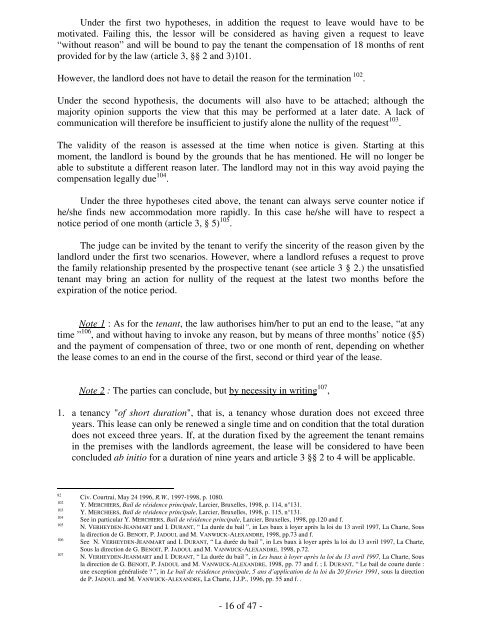- 1 of 47 - BELGIUM Catherine DELFORGE and Ludivine ...
- 1 of 47 - BELGIUM Catherine DELFORGE and Ludivine ...
- 1 of 47 - BELGIUM Catherine DELFORGE and Ludivine ...
Create successful ePaper yourself
Turn your PDF publications into a flip-book with our unique Google optimized e-Paper software.
Under the first two hypotheses, in addition the request to leave would have to be<br />
motivated. Failing this, the lessor will be considered as having given a request to leave<br />
“without reason” <strong>and</strong> will be bound to pay the tenant the compensation <strong>of</strong> 18 months <strong>of</strong> rent<br />
provided for by the law (article 3, §§ 2 <strong>and</strong> 3)101.<br />
However, the l<strong>and</strong>lord does not have to detail the reason for the termination 102 .<br />
Under the second hypothesis, the documents will also have to be attached; although the<br />
majority opinion supports the view that this may be performed at a later date. A lack <strong>of</strong><br />
communication will therefore be insufficient to justify alone the nullity <strong>of</strong> the request 103 .<br />
The validity <strong>of</strong> the reason is assessed at the time when notice is given. Starting at this<br />
moment, the l<strong>and</strong>lord is bound by the grounds that he has mentioned. He will no longer be<br />
able to substitute a different reason later. The l<strong>and</strong>lord may not in this way avoid paying the<br />
compensation legally due 104 .<br />
Under the three hypotheses cited above, the tenant can always serve counter notice if<br />
he/she finds new accommodation more rapidly. In this case he/she will have to respect a<br />
notice period <strong>of</strong> one month (article 3, § 5) 105 .<br />
The judge can be invited by the tenant to verify the sincerity <strong>of</strong> the reason given by the<br />
l<strong>and</strong>lord under the first two scenarios. However, where a l<strong>and</strong>lord refuses a request to prove<br />
the family relationship presented by the prospective tenant (see article 3 § 2.) the unsatisfied<br />
tenant may bring an action for nullity <strong>of</strong> the request at the latest two months before the<br />
expiration <strong>of</strong> the notice period.<br />
Note 1 : As for the tenant, the law authorises him/her to put an end to the lease, “at any<br />
time ” 106 , <strong>and</strong> without having to invoke any reason, but by means <strong>of</strong> three months’ notice (§5)<br />
<strong>and</strong> the payment <strong>of</strong> compensation <strong>of</strong> three, two or one month <strong>of</strong> rent, depending on whether<br />
the lease comes to an end in the course <strong>of</strong> the first, second or third year <strong>of</strong> the lease.<br />
Note 2 : The parties can conclude, but by necessity in writing 107 ,<br />
1. a tenancy "<strong>of</strong> short duration", that is, a tenancy whose duration does not exceed three<br />
years. This lease can only be renewed a single time <strong>and</strong> on condition that the total duration<br />
does not exceed three years. If, at the duration fixed by the agreement the tenant remains<br />
in the premises with the l<strong>and</strong>lords agreement, the lease will be considered to have been<br />
concluded ab initio for a duration <strong>of</strong> nine years <strong>and</strong> article 3 §§ 2 to 4 will be applicable.<br />
82 Civ. Courtrai, May 24 1996, R.W., 1997-1998, p. 1080.<br />
102 Y. MERCHIERS, Bail de résidence principale, Larcier, Bruxelles, 1998, p. 114, n°131.<br />
103 Y. MERCHIERS, Bail de résidence principale, Larcier, Bruxelles, 1998, p. 115, n°131.<br />
104 See in particular Y. MERCHIERS, Bail de résidence principale, Larcier, Bruxelles, 1998, pp.120 <strong>and</strong> f.<br />
105 N. VERHEYDEN-JEANMART <strong>and</strong> I. DURANT, “ La durée du bail ”, in Les baux à loyer après la loi du 13 avril 1997, La Charte, Sous<br />
la direction de G. BENOIT, P. JADOUL <strong>and</strong> M. VANWIJCK-ALEXANDRE, 1998, pp.73 <strong>and</strong> f.<br />
106 See N. VERHEYDEN-JEANMART <strong>and</strong> I. DURANT, “ La durée du bail ”, in Les baux à loyer après la loi du 13 avril 1997, La Charte,<br />
Sous la direction de G. BENOIT, P. JADOUL <strong>and</strong> M. VANWIJCK-ALEXANDRE, 1998, p.72.<br />
107 N. VERHEYDEN-JEANMART <strong>and</strong> I. DURANT, “ La durée du bail ”, in Les baux à loyer après la loi du 13 avril 1997, La Charte, Sous<br />
la direction de G. BENOIT, P. JADOUL <strong>and</strong> M. VANWIJCK-ALEXANDRE, 1998, pp. 77 <strong>and</strong> f. ; I. DURANT, “ Le bail de courte durée :<br />
une exception généralisée ? ”, in Le bail de résidence principale, 5 ans d’application de la loi du 20 février 1991, sous la direction<br />
de P. JADOUL <strong>and</strong> M. VANWIJCK-ALEXANDRE, La Charte, J.J.P., 1996, pp. 55 <strong>and</strong> f. .<br />
- 16 <strong>of</strong> <strong>47</strong> -

















